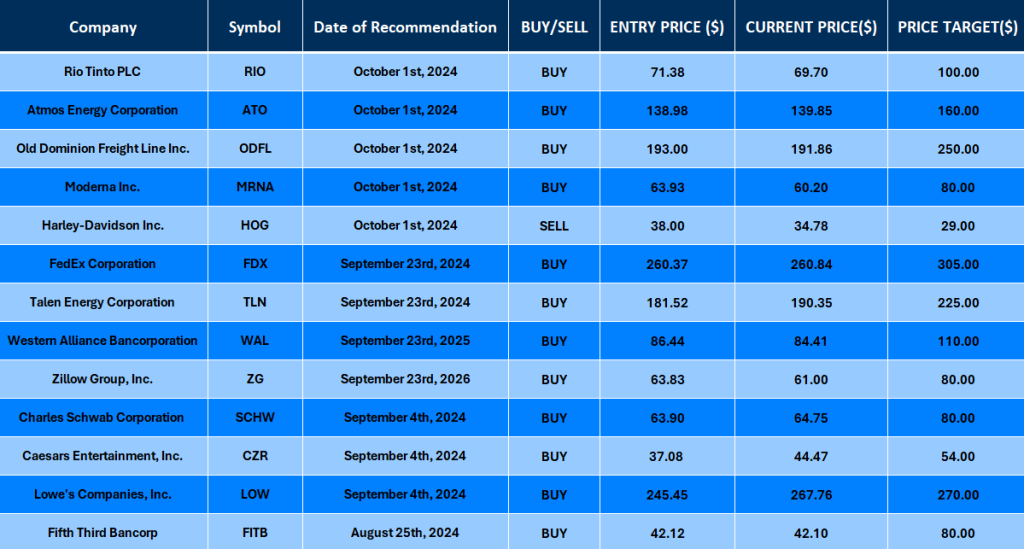
Date Issued – 7th October 2024
Preview
In today’s newsletter, we provide a detailed overview of the weekend, covering key developments such as the U.S. jobs report, the resolution of the U.S. port strike, and updates on global inflation and renewable energy markets.
U.S. Jobs Report Exceeds Expectations, Boosting Market Confidence
On Friday, October 4, the U.S. Labor Department reported an unexpected surge in job growth, with 254,000 new positions added in September, significantly surpassing the forecast of 150,000. The unemployment rate fell to 4.1%, down from 4.2%, signaling a resilient labor market despite rising interest rates and inflation concerns. Wage growth, up by 4% year-over-year, highlights continued consumer spending strength, supporting retail and service sectors.
The report underscores the effectiveness of the Federal Reserve’s calibrated rate cuts aimed at balancing economic growth and inflation control. With labor force participation steady, economists anticipate that the Fed will continue its cautious approach, likely implementing a modest 0.25% rate cut in November. This gradual easing aims to maintain market confidence while tempering inflation.
Market Price: S&P 500 Index: 4,412.35 USD
U.S. Port Strike Ends, Alleviating Global Supply Chain Pressures
The U.S. dockworkers’ strike, which had halted operations across 36 major ports and disrupted supply chains, ended with a provisional agreement reached over the weekend. The contract will temporarily extend until January 15, 2025, allowing operations to resume fully. This resolution comes as a critical relief for industries dependent on smooth shipping routes, especially retail, automotive, and technology sectors, as they prepare for the peak holiday season.
The strike’s resolution has eased immediate concerns about escalating supply chain costs and inflationary pressures. However, experts caution that the temporary nature of the agreement could mean potential disruptions early next year if negotiations do not conclude successfully.
Market Price: Maersk Stock: 1,290 EUR

Euro Weakens as Europe Faces Growth Stagnation and Inflationary Pressures
The euro has dropped to 1.0453 USD, highlighting ongoing challenges within the Eurozone as economic growth stagnates while inflation remains high. With manufacturing output declining and consumer sentiment weakening, the region’s economic recovery faces significant headwinds. The European Central Bank (ECB) is under increasing pressure to address these issues, balancing the need for growth stimulation with the risk of further inflation.
ECB officials are considering more aggressive measures, including potential interest rate cuts and quantitative easing to inject liquidity into the economy. However, such moves come with risks, particularly as inflationary pressures remain strong in certain member states. The divergence in economic performance between core and peripheral countries adds complexity to the ECB’s decision-making process.
Market Price: EUR/USD: 1.0453 USD
Turkish Inflation Falls Below 50%, Aiding Economic Recovery Efforts
Turkey has reported that its inflation rate has dropped below 50% for the first time in over a year, signaling progress in the central bank’s efforts to stabilize the economy. Following a series of aggressive interest rate hikes, inflation decelerated, providing a much-needed reprieve to businesses and consumers. The Turkish lira has responded positively, gaining some ground against the U.S. dollar, though it remains under pressure as the country navigates economic recovery.
Despite the improvement, Turkey’s economic outlook remains fragile, and experts caution that additional monetary tightening might be necessary to ensure inflation does not resurge. The government’s policy focus is shifting towards long-term growth strategies, including expanding the industrial base and boosting exports.
Market Price: Turkish Lira (USD/TRY): 27.14 USD
U.S. and Indian Solar Sectors Surge as Washington Imposes Tariffs on Chinese Imports
The U.S. has implemented stricter tariffs on Chinese solar panel imports, citing concerns over unfair market practices and the need to secure domestic production capabilities. This move has reshaped the global solar market, with U.S. and Indian companies rapidly expanding to fill the gap left by reduced Chinese competition. India, in particular, has positioned itself as a key player, with its solar firms seeing increased demand both domestically and internationally.
These policy changes are expected to boost renewable energy stocks in North America and India as both regions capitalize on the new market dynamics. While these tariffs are designed to reduce reliance on Chinese imports, they may also raise short-term costs for U.S. solar projects until domestic production scales up fully.
Market Price: First Solar (FSLR): 168.75 USD
Conclusion: Staying Proactive in a Dynamic Global Landscape
Over the weekend we have seen big development, from the strong U.S. labor market performance to supply chain resolutions and global policy changes. Investors should remain proactive, leveraging opportunities in growth sectors like renewable energy and emerging markets, while being mindful of ongoing risks in European economies. As always, we are here to provide insights and support for your investment strategy.
Upcoming Dates to Watch:
- October 10: U.S. Federal Reserve minutes release, potentially signaling future rate cuts.
- October 15: Eurozone inflation report and ECB policy update.
- Early November: Next U.S. employment data release, offering further economic insights.
Find below some of our Buy/Sell Recommendations. Balfour Capital Group is a distinguished global boutique investment management firm with $400 million AUM and over 1000 Clients.

Disclaimer: This post provides financial insights for informational purposes only. It does not constitute financial advice or recommendations for investment decisions.

